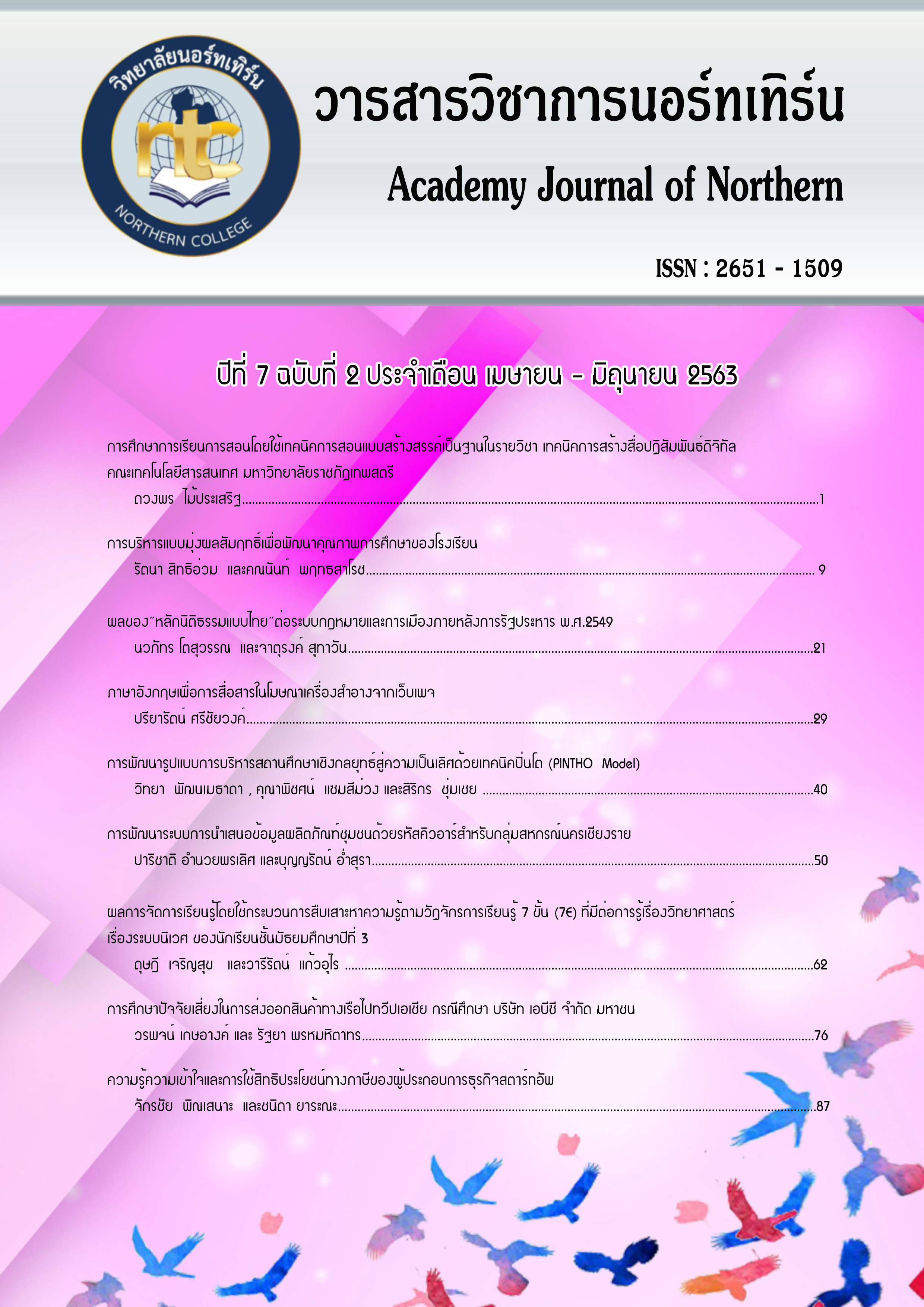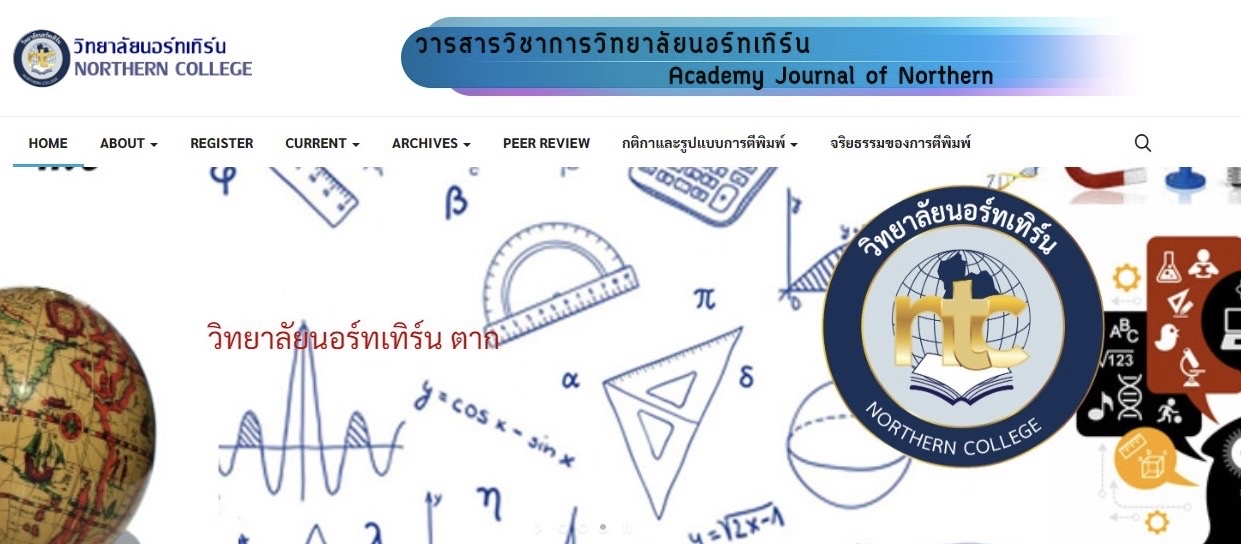Understanding and Utilizing Tax Benefits of Start-up Business Entrepreneurs
Keywords:
Understanding, Tax benefits, Start-up businessAbstract
The purpose of this research is to study knowledge and understanding of the tax benefits for start-up business entrepreneurs. The samples used in this study were start-up business entrepreneurs who were certified by the National Science and Technology Development Agency (NSTDA). Qualitative research method is being used in in-depth interview. Five samples were selected by purposive sampling method.The research tool used was a semi-structured interview form. According to the study, it has been found that start-up business entrepreneurs have knowledge and understanding of tax benefits related to start-up businesses. The benefits that the government issued were utilized due to newly established business which found that the revenue received by start-up entrepreneurs was low resulting in exemption of taxes for 5 accounting periods for business entrepreneurs that have already been certified as start-up entrepreneurs from the National Science and Technology Development Agency (NSTDA).
References
กรมประชาสัมพันธ์. (มิถุนายน 2559). การเพิ่มศักยภาพของสตาร์ทอัพ. จดหมายข่าวจากรัฐบาลเพื่อประชาชน. สืบค้นเมื่อ 12 พฤศจิกายน 2561, เข้าถึงได้จาก www.prd.go.th /download/article/article_20160527222254.
กรมสรรพากร. (สิงหาคม 2560). สิทธิประโยชน์ทางภาษีอากรตามมาตรการภาษีของรัฐบาล.สืบค้นเมื่อ 18 ธันวาคม 2561, เข้าถึงจาก www.rd.go.th/publish/49125.0.html.
กระทรวงอุตสาหกรรม. (พฤษภาคม 2559). Startup. สืบค้นเมื่อ 20 ตุลาคม 2561, จากเข้าถึงได้จาก www.industry.go.th/ industry/index.php/th/knowledge/item/10604-startup.
ชัยวัฒน์ ใบไม้. (2560). สตาร์ทอัพ: นิยาม ความสำคัญ และแนวทางการทำวิจัย. วารสารนักบริหาร. 37(2),10-21.
ณฤทธิ์ วรพงษ์ดี. (ตุลาคม 2561). รู้จักธุรกิจสตาร์ทอัพ. วารสารเซทรู้จักธุรกิจสตาร์ทอัพ. สืบค้นเมื่อ 20 ตุลาคม 2561, เข้าถึงได้จาก www.set.or.th/education/th/ enterprise/ files/สตาร์ทอัพ_business_guide.
ทิบดี ทัฬหกรณ์ และธีระวัฒน์ จันทึก. (2560). การสร้างผู้ประกอบการณ์รุ่นใหม่ในยุคไทยแลนด์ 4.0.วารสารบริหารธุรกิจ มหาวิทยาลัยเทคโนโลยีราชมงคลธัญบุรี 12(2).
ธนาคารกรุงไทย. (มีนาคม 2560). ความแตกต่าง SME และ สตาร์ทอัพ. สารวิจัยธุรกิจ.สืบค้นเมื่อ 12 กันยายน 2561, เข้าถึงได้จาก www.ktb.co.th/Download/ economyresources/EconomyResourcesDownload_424res0560.
พิศมัย หมอยาดี. (2557). ปัจจัยที่มีผลกระทบต่อการช าระภาษีเงินได้นิติบุคคล ในเขตกรุงเทพมหานคร. วิทยานิพนธ์บธ.ม., มหาวิทยาลัยรามคำแหง, กรุงเทพมหานคร.
วิไล พึ่งผล และวิโรจน์ เจษฎาลักษณ์. (2561). คุณลักษณะความเป็นผู้ประกอบการรุ่นใหม่ที่ส่งผลต่อการดำเนินธุรกิจผ่านความได้เปรียบทางการแข่งขันของธุรกิจสตาร์ทอัพ. วารสารการจัดการวิทยาลัยดุสิตธานี 12(2).
ศาสตรา สุดสวาท และภาวิน ศิริประภานุกูล. (2561). รายจ่ายภาษีเงินได้นิติบุคคลแห่งประเทศไทย.วารสารเศรษฐศาสตร์ มหาวิทยาลัยธรรมศาสตร์ 36(2).
เจษฎา สุขทิศ. (กรกฎาคม 2561). 4ทักษะที่ผู้ประกอบการ Startup & SME ต้องมี. กรุงเทพธุรกิจ.สืบค้นเมื่อวันที่ 24 กุมภาพันธ์,เข้าถึงได้จาก www.bangkokbiznews.com/blog/detail/645143.
Joseph Rosenberg , Donald Marron. (2015). นโยบายภาษีและการลงทุนโดยการริเริ่มนวัตกรรมใหม่ๆ TAX POLICY CENTER.
Downloads
Published
How to Cite
Issue
Section
License
Copyright (c) 2023 Academy Journal of Northern

This work is licensed under a Creative Commons Attribution-NonCommercial-NoDerivatives 4.0 International License.







